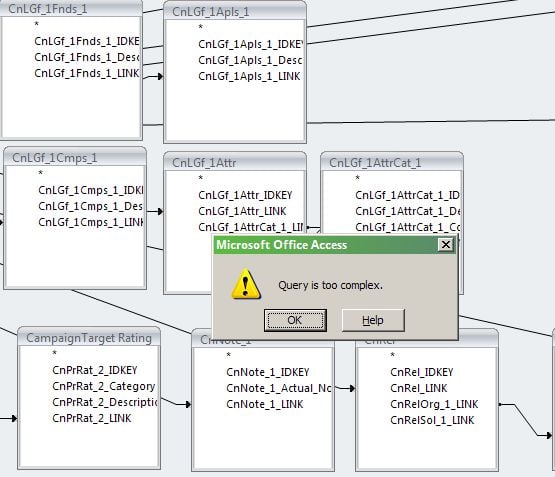Like vs Contains
Chher
Comments
-
I would use Like instead of Contains if I was looking for something that I know must begin with a series of characters, not merely contain it. The query "Name like Alan%" is going to run much more quickly than "Name contains Alan" since RE can immediately disregard any value that doesn't begin with the word Alan.1
-
Alan French:
I would use Like instead of Contains if I was looking for something that I know must begin with a series of characters, not merely contain it. The query "Name like Alan%" is going to run much more quickly than "Name contains Alan" since RE can immediately disregard any value that doesn't begin with the word Alan.Cheers Alan, would you not use the Begins With operator in that example though?
1 -
Yes, good point and bad example!1
-
Contains is usually used to compare one item, for example: "Smith" with a list of items: "Smith, Lane, Johnson, Carter"
Like is used to compare one item "Smith" with "Smi%". This will return not only Smith, but Smitty, Smithy, etc.
Does that help?
Thanks!1 -
Tim Stahl:
Contains is usually used to compare one item, for example: "Smith" with a list of items: "Smith, Lane, Johnson, Carter"
Like is used to compare one item "Smith" with "Smi%". This will return not only Smith, but Smitty, Smithy, etc.
Does that help?
Thanks!Cheers Tim. To get the same result as the Like example above, I could just use Begins With "Smi" though right?
1 -
Yes! Absolutely. Like can also be used to find things in the middle of a word, for example: "%are%" could match to Care, or area.1
-
That's what Contains does!1
-
Perhaps Contains was added more recently to remove the need to use wildcards? I guess not everyone is familiar with how to use them.
Does anyone have the RODBA module and can test whether the query generates the same SQL code for both "contains Smith" and "like %Smith%"? I'm intrigued...1 -
Alan French:
Perhaps Contains was added more recently to remove the need to use wildcards? I guess not everyone is familiar with how to use them.
Does anyone have the RODBA module and can test whether the query generates the same SQL code for both "contains Smith" and "like %Smith%"? I'm intrigued...That's what I was thinking. It would appear that Like and Not Like can replicate all the functionality of at least Begins With, Does Not Begin With, Contains and Does Not Contain, assuming appropriate use of wildcards. I just want to make sure I'm not missing something!
1 -
Yeah I have RODBA and took a look. If you say first name contains Jam, the SQL it generates is:
WHERE [first_name] LIKE '%Jam%'
Like just translates whatever you put in there to SQL. So if you say first name like Jam*, the SQL it generates is
WHERE [first_name] LIKE 'Jam%'
So yes, it'll probably be quicker if you use like and specify your wildcards, but only if you have the wildcard at the end of the string rather than the beginning, because if you say first name like *Jam*, it'll return the same SQL as if you say first name contains Jam.3 -
You're good to go, that's correct! Like and Contains are really SQL database terms. When dealing with database folks like myself, those just make sense to me :-)1
-
Perfect, cheers James. Reckon I'll just use Like as I would in SQL just to avoid any ambiguity!1
-
Tim Stahl:
You're good to go, that's correct! Like and Contains are really SQL database terms. When dealing with database folks like myself, those just make sense to me :-)From the RODBA extract it doesn't look like the the Contains operator is equivalent to the CONTAINS predicate in SQL though. It's just mapping it to LIKE with bounding wildcards. So it appears there's no functional difference between the two RE operators besides the requirement to include at least one wildcard when adding a Like, i.e. there's no functional or performance advantage to using Contains "badger" over Like "%badger%".
3 -
Grant Quick:
From the RODBA extract it doesn't look like the the Contains operator is equivalent to the CONTAINS predicate in SQL though. It's just mapping it to LIKE with bounding wildcards. So it appears there's no functional difference between the two RE operators besides the requirement to include at least one wildcard when adding a Like.Yeah exactly. Contains just cuts out a couple keystrokes for the user, is all.
2
Categories
- All Categories
- Shannon parent
- shannon 2
- shannon 1
- 21 Advocacy DC Users Group
- 14 BBCRM PAG Discussions
- 89 High Education Program Advisory Group (HE PAG)
- 28 Luminate CRM DC Users Group
- 8 DC Luminate CRM Users Group
- Luminate PAG
- 5.9K Blackbaud Altru®
- 58 Blackbaud Award Management™ and Blackbaud Stewardship Management™
- 409 bbcon®
- 2.1K Blackbaud CRM™ and Blackbaud Internet Solutions™
- donorCentrics®
- 1.1K Blackbaud eTapestry®
- 2.8K Blackbaud Financial Edge NXT®
- 1.1K Blackbaud Grantmaking™
- 527 Education Management Solutions for Higher Education
- 1 JustGiving® from Blackbaud®
- 4.6K Education Management Solutions for K-12 Schools
- Blackbaud Luminate Online & Blackbaud TeamRaiser
- 16.4K Blackbaud Raiser's Edge NXT®
- 4.1K SKY Developer
- 547 ResearchPoint™
- 151 Blackbaud Tuition Management™
- 1 YourCause® from Blackbaud®
- 61 everydayhero
- 3 Campaign Ideas
- 58 General Discussion
- 115 Blackbaud ID
- 87 K-12 Blackbaud ID
- 6 Admin Console
- 949 Organizational Best Practices
- 353 The Tap (Just for Fun)
- 235 Blackbaud Community Feedback Forum
- 55 Admissions Event Management EAP
- 18 MobilePay Terminal + BBID Canada EAP
- 36 EAP for New Email Campaigns Experience in Blackbaud Luminate Online®
- 109 EAP for 360 Student Profile in Blackbaud Student Information System
- 41 EAP for Assessment Builder in Blackbaud Learning Management System™
- 9 Technical Preview for SKY API for Blackbaud CRM™ and Blackbaud Altru®
- 55 Community Advisory Group
- 46 Blackbaud Community Ideas
- 26 Blackbaud Community Challenges
- 7 Security Testing Forum
- 1.1K ARCHIVED FORUMS | Inactive and/or Completed EAPs
- 3 Blackbaud Staff Discussions
- 7.7K ARCHIVED FORUM CATEGORY [ID 304]
- 1 Blackbaud Partners Discussions
- 1 Blackbaud Giving Search™
- 35 EAP Student Assignment Details and Assignment Center
- 39 EAP Core - Roles and Tasks
- 59 Blackbaud Community All-Stars Discussions
- 20 Blackbaud Raiser's Edge NXT® Online Giving EAP
- Diocesan Blackbaud Raiser’s Edge NXT® User’s Group
- 2 Blackbaud Consultant’s Community
- 43 End of Term Grade Entry EAP
- 92 EAP for Query in Blackbaud Raiser's Edge NXT®
- 38 Standard Reports for Blackbaud Raiser's Edge NXT® EAP
- 12 Payments Assistant for Blackbaud Financial Edge NXT® EAP
- 6 Ask an All Star (Austen Brown)
- 8 Ask an All-Star Alex Wong (Blackbaud Raiser's Edge NXT®)
- 1 Ask an All-Star Alex Wong (Blackbaud Financial Edge NXT®)
- 6 Ask an All-Star (Christine Robertson)
- 21 Ask an Expert (Anthony Gallo)
- Blackbaud Francophone Group
- 22 Ask an Expert (David Springer)
- 4 Raiser's Edge NXT PowerUp Challenge #1 (Query)
- 6 Ask an All-Star Sunshine Reinken Watson and Carlene Johnson
- 4 Raiser's Edge NXT PowerUp Challenge: Events
- 14 Ask an All-Star (Elizabeth Johnson)
- 7 Ask an Expert (Stephen Churchill)
- 2025 ARCHIVED FORUM POSTS
- 322 ARCHIVED | Financial Edge® Tips and Tricks
- 164 ARCHIVED | Raiser's Edge® Blog
- 300 ARCHIVED | Raiser's Edge® Blog
- 441 ARCHIVED | Blackbaud Altru® Tips and Tricks
- 66 ARCHIVED | Blackbaud NetCommunity™ Blog
- 211 ARCHIVED | Blackbaud Target Analytics® Tips and Tricks
- 47 Blackbaud CRM Higher Ed Product Advisory Group (HE PAG)
- Luminate CRM DC Users Group
- 225 ARCHIVED | Blackbaud eTapestry® Tips and Tricks
- 1 Blackbaud eTapestry® Know How Blog
- 19 Blackbaud CRM Product Advisory Group (BBCRM PAG)
- 1 Blackbaud K-12 Education Solutions™ Blog
- 280 ARCHIVED | Mixed Community Announcements
- 3 ARCHIVED | Blackbaud Corporations™ & Blackbaud Foundations™ Hosting Status
- 1 npEngage
- 24 ARCHIVED | K-12 Announcements
- 15 ARCHIVED | FIMS Host*Net Hosting Status
- 23 ARCHIVED | Blackbaud Outcomes & Online Applications (IGAM) Hosting Status
- 22 ARCHIVED | Blackbaud DonorCentral Hosting Status
- 14 ARCHIVED | Blackbaud Grantmaking™ UK Hosting Status
- 117 ARCHIVED | Blackbaud CRM™ and Blackbaud Internet Solutions™ Announcements
- 50 Blackbaud NetCommunity™ Blog
- 169 ARCHIVED | Blackbaud Grantmaking™ Tips and Tricks
- Advocacy DC Users Group
- 718 Community News
- Blackbaud Altru® Hosting Status
- 104 ARCHIVED | Member Spotlight
- 145 ARCHIVED | Hosting Blog
- 149 JustGiving® from Blackbaud® Blog
- 97 ARCHIVED | bbcon® Blogs
- 19 ARCHIVED | Blackbaud Luminate CRM™ Announcements
- 161 Luminate Advocacy News
- 187 Organizational Best Practices Blog
- 67 everydayhero Blog
- 52 Blackbaud SKY® Reporting Announcements
- 17 ARCHIVED | Blackbaud SKY® Reporting for K-12 Announcements
- 3 Luminate Online Product Advisory Group (LO PAG)
- 81 ARCHIVED | JustGiving® from Blackbaud® Tips and Tricks
- 1 ARCHIVED | K-12 Conference Blog
- Blackbaud Church Management™ Announcements
- ARCHIVED | Blackbaud Award Management™ and Blackbaud Stewardship Management™ Announcements
- 1 Blackbaud Peer-to-Peer Fundraising™, Powered by JustGiving® Blogs
- 39 Tips, Tricks, and Timesavers!
- 56 Blackbaud Church Management™ Resources
- 154 Blackbaud Church Management™ Announcements
- 1 ARCHIVED | Blackbaud Church Management™ Tips and Tricks
- 11 ARCHIVED | Blackbaud Higher Education Solutions™ Announcements
- 7 ARCHIVED | Blackbaud Guided Fundraising™ Blog
- 2 Blackbaud Fundraiser Performance Management™ Blog
- 9 Foundations Events and Content
- 14 ARCHIVED | Blog Posts
- 2 ARCHIVED | Blackbaud FIMS™ Announcement and Tips
- 59 Blackbaud Partner Announcements
- 10 ARCHIVED | Blackbaud Impact Edge™ EAP Blogs
- 1 Community Help Blogs
- Diocesan Blackbaud Raiser’s Edge NXT® Users' Group
- Blackbaud Consultant’s Community
- Blackbaud Francophone Group
- 1 BLOG ARCHIVE CATEGORY
- Blackbaud Community™ Discussions
- 8.3K Blackbaud Luminate Online® & Blackbaud TeamRaiser® Discussions
- 5.7K Jobs Board








